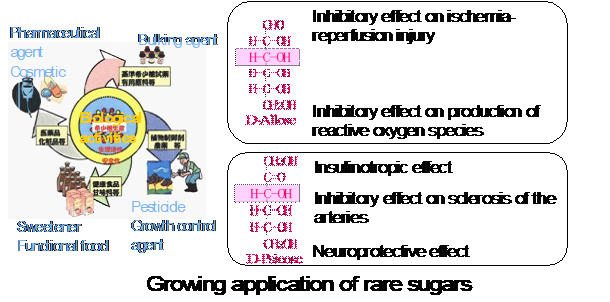”Rare sugars” Research Project


“Rare sugars” are monosaccharides which occur only rarely in nature, and
they come in about 50 types such as D-psicose and D-allose. We have perfected
a novel strategy for producing these systematically, and have completed
design schemes for producing all rare sugars. The rare sugars produced
using this strategy have been discovered to have previously unanticipated
bioactivity and new physical/chemical properties. Our aim is the creation
of a new “sugar life science” and a “sugar bioindustry” via the mass production
of rare sugars, and a detailed examination of their bioactivities.
In 2002, this research project was designated as one of the “Knowledge
Clusters” by The Ministry of Education, Culture, Sports, Science and Technology
(MEXT). A Knowledge Cluster is a local technological innovation system
organized around universities and other public research institutes.
1) “Izumoring”: a production strategy for all rare sugars

We have perfected the “Izumoring” production strategy for all rare sugars. Various rare sugars can be produced using this method. The process works as follows: from starch to D-glucose, to D-fructose, and then on to the world of rare sugars. D-psicose is the gateway to that world. Then, with Dpsicose as the raw material, other new rare sugars are produced, including D-allose and allitol. In this way, it has become possible to produce the eight types of ketoses that serve as the root sugars, and these ketoses have been distributed to all researchers.

2) Applicative research of rare sugars
i) Application to plants
It has been confirmed that plants recognize D-psicose. We have determined
that rare sugars help to control the growth of plants, and that even low
concentrations of rare sugars are effective. We have also learned that
rare sugars act to increase the resistivity of plants. Using this action,
development of novel agricultural chemicals has been started.
ii) Applications in food products and sweeteners
Rare sugars, as sugars, are naturally sweet. But they are more than just sweet: their positive effects on human health have also been discovered. Rare sugars have the potential to be used in sweeteners and as food products with new functional characteristics. We are developing new food products that utilize the benefits of the rare sugar D-psicose (low energy, reduction of fat and blood sugar levels, etc.). We have also confirmed its advantages and basic safety as a food material, including such characteristics as its role in the Maillard reaction and its antioxidant action.
iii) Applications in pharmaceuticals

We have also confirmed their functionality as pharmaceuticals, and our dreams continue to expand regarding their use in new types of drugs. These include: inhibition of oxygen free-radical production, protection against internal organ ischemia, inhibition of cancer cell proliferation, preventive effects against diabetes and arteriosclerosis, and inhibition of fat synthesis. Such research has reached the animal-testing stage.
3) Rare Sugar Research Center (RSRC) and International Society of Rare Sugars (ISRS)
RSRC was established in October 2003. It’s original studies on “rare sugars” have enabled it to become the world center of a new “sugar life science”. RSRC houses the head office of ISRS which has been progressively sending and receiving information on rare sugars to and from the world.